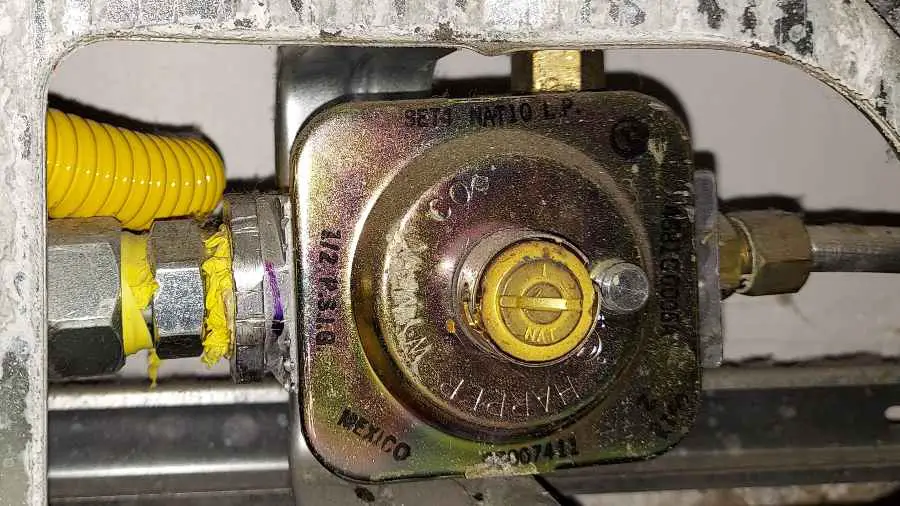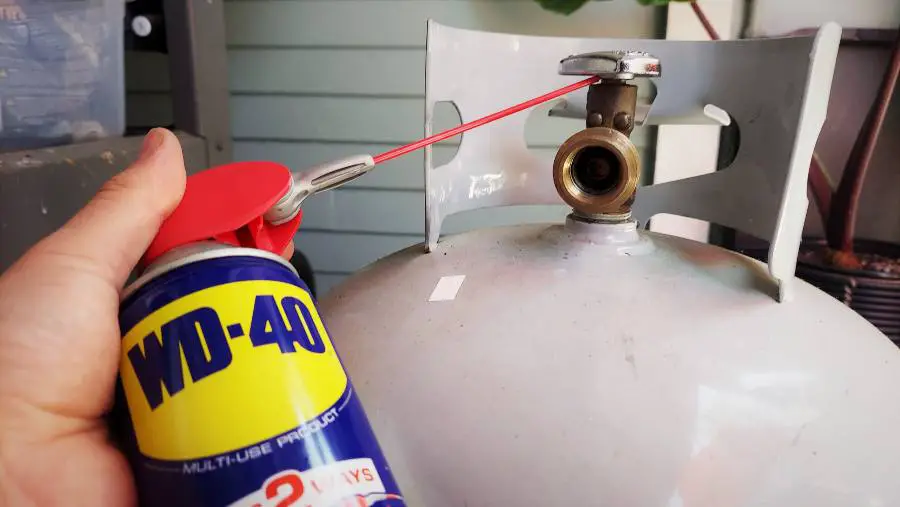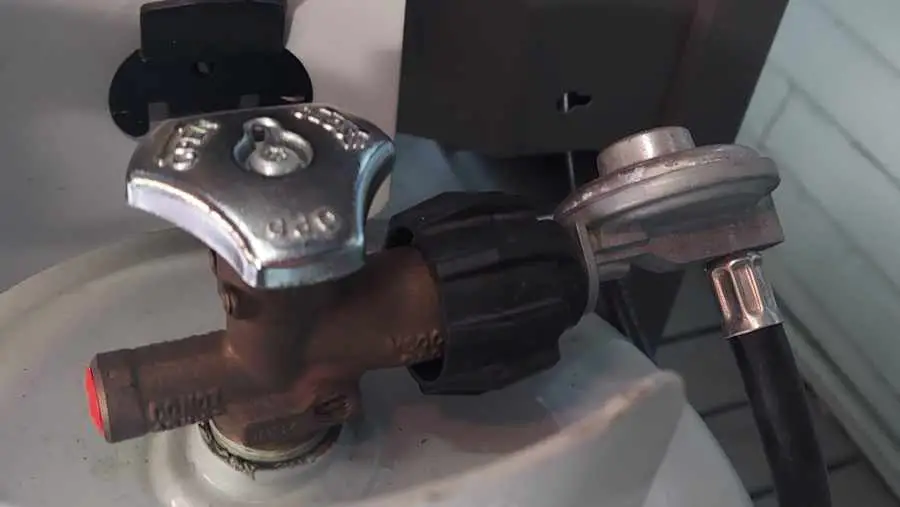Last Updated on May 23, 2024 by Dan Campbell
Being Prepared is Key to Living Off Grid
Just as you will have to be prepared while living off grid, you’ll need to be prepared before you even begin. There will never be one, or even 20 books that will be enough to cover the information you’ll need to learn to live off grid. A lot of it will come from trying, failing, and trying again. But reading a few books before you begin your journey will only increase your chances of success, as well as get you to ask questions you may not have thought about before.
In this article, I am highlighting just five books I believe will be beneficial for you to start living off grid, but I highly recommend reading more and specifically, finding areas you want to focus on and finding books related to that specific subject, whether that’s solar powered systems, gardening, or construction.
The books I mention below range from general knowledge and how-to’s, to specific guides on systems that will help you live self-sufficiently. By reading these books, you’ll learn how to live off grid, how to survive on your own, and get you to ask questions about yourself and what living off grid means to you. Most of these books are for beginners, and will only help you begin your journey to living off grid. I strongly recommend doing further research, whether that’s reading more books, watching videos online, or learning from a friend before you take the jump to off grid living full-time.
#1 The Foxfire Book
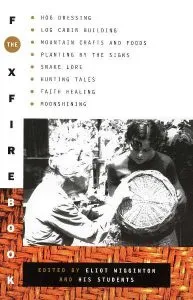 About The Book
About The Book
The Foxfire Book was published in an effort to preserve and share traditional American homesteading practices. The book is based on interviews with the locals of an Appalachian community and shares stories and methods of living off the land. The book contains multiple topics such as hunting, fishing, cooking, and traditional crafting techniques. The book was published in 1972 and became a national best-seller. It was followed by a series of other books, all with similar stories and accounts of off grid living. The Foxfire books are easy to read and share a lot of practical knowledge that will help you live off the land and take care of your home.
I am only discussing the first book in this article, but I highly recommend buying the full Foxfire series if you enjoy the first book. The topics in the book can be a little outdated and are mostly focused on the local fauna and climate of the Appalachians, but overall it’s got a lot of great information that can translate to where you plan on living.
What You’ll Learn From This Book
This book will teach you a variety of practical skills for homesteading, most of which are traditional and were passed down from generation-to-generation. This is a great book if you also enjoy history and learning traditional techniques.
Some of the skills you’ll learn about:
- Cooking traditional southern Appalachian recipes, such as making lye soap and curing bacon
- Building and maintaining traditional structures, such as log cabins and chimneys
- Making traditional crafts, such as quilts, pottery, and baskets
- Hunting and fishing techniques, such as tracking and trapping game, and fly-fishing
- Traditional herbal medicine and natural remedies
- Understanding of the traditional ways of living and the cultural background of the southern Appalachians.
The book contains a lot of illustrations and step-by-step instructions making it very easy to understand. So even if you’re not planning on living in the Appalachian mountains, there’s something you can learn from this book to help you.
#2 Back to Basics: A Complete Guide to Traditional Skills
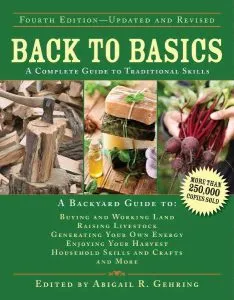 About The Book
About The Book
This is a great book to get started with living off the grid. It contains a wide range of traditional skills and methods for living self-sufficiently and sustainably off the land. Topics range from gardening, livestock, building/repairing, blacksmithing, preparing and preserving food, and even how to dye wool with plant pigments. The newly updated version has pictures and step-by-step instructions making it easier to understand. Even before you are living off grid, this book will give you plenty of information to begin planning your off grid home as well as give some insights into things to look out for.
What You’ll Learn From This Book
This book will teach you just about everything you’ll need to know for self-sufficiency and sustainability.
Some of the skills you’ll learn about:
- Gardening and raising livestock, such as growing vegetables, fruits, and herbs, and caring for chickens, pigs, and other small animals
- Building and repairing structures, such as building a small cabin, installing a wood stove, and making minor repairs around the house
- Traditional crafts and skills, such as blacksmithing, candle making, soap making, spinning and weaving, and more.
- Food preservation techniques, such as canning, drying, and fermenting
- Energy production and storage, such as using solar and wind power, and traditional methods of heating and lighting
- Home maintenance, such as making your home energy-efficient, and making cleaning and laundry products from natural ingredients
- Survival skills and self-defense techniques
- Traditional knowledge about living off the land and being self-sufficient
It’s also a great reference guide to hold onto in case you ever forget something since it contains information on a large number of topics, or for exploring new topics once you’re settled.
#3 The New Complete Book of Self-Sufficiency
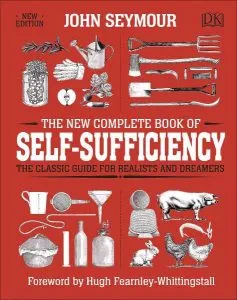 About The Book
About The Book
This book is one of the top books I would recommend for anyone trying to become more self-sufficient. Written by John Seymour, proclaimed as “The Founding Father” of the self-sufficiency movement, this book was “the internet” for anyone trying to find information on self-sufficiency before the internet was mainstream. Similar to Back to Basics, it has multiple chapters on various topics, which it touches lightly on, but just enough to get you started and looking for the next question to ask yourself. It’s got information on felling trees, gardening, solar power, preserving food, brewing, and more.
What You’ll Learn From This Book
Similar to Back To Basics, this book will teach you a little bit of everything you need to know about living self-sufficiently.
Some of the skills you’ll learn about:
- Gardening – there is a dense amount of information in here about general gardening, when to plant, how to plant, and preserving the harvest afterwards
- Livestock management, how to maintain your livestock as well as how to slaughter your livestock.
- Milking a cow, shearing sheep, plucking chickens, and more
- Cooking/baking recipes such as bread making, curing food, making butter and cheese, preserving food, and my favorite, brewing beer and making wine
- How to manage your land, such as pruning trees, managing pests
- How to hunt for small game and fish, as well as how to prepare them
Similar to Back to Basics, this is a book you’ll want to hold onto for reference, or for when you start a new project and want to see some examples. The illustrations in this book are honestly one of the big reasons I mention this book, they are so detailed and well done they do better than an actual photograph could do.
#4 Solar & 12 Volt Power for Beginners: Off Grid Power for Everyone
 About The Book
About The Book
Most likely you’ll be using some form of solar power on your off grid setup, and this book is a great beginner guide that provides detailed information and instructions on how to make use of solar power and 12-volt systems to generate electricity. Because this is a beginners book, it is a great introduction to solar power and working with electricity for people with little to no experience with solar and 12-volt power systems. It covers a lot of different topics such as how to choose the right solar panels and batteries for your setup, wiring, and installation, as well as maintaining and troubleshooting your system. It also includes examples of different setups which can help you get an idea of what you can do on your own.
What You’ll Learn From This Book
By reading this book you’ll gain a much better understanding of solar power systems and 12v power systems. You’ll learn how to calculate your solar needs, come up with a system that works for your needs, as well as how to install it. And even if you’re not working directly with solar, it’ll help you get a better understanding of electricity and power supply systems.
Some of the skills you’ll learn about:
Understanding the basics of solar and 12-volt power systems, including how they work and how to choose the right components for your setup
- How to install and wire your solar panels/batteries
- How to maintain and troubleshoot your power system
- How to calculate how much power you need and design a system to meet and exceed those needs
- How to monitor and optimize your system’s performance
- Tips and tricks for making your off-grid lifestyle work for you, such as choosing optimal locations and positions for solar panels on your home.
So if you’re not familiar with solar panels or working with electricity, this is a great beginners book to get your foot in the door. I would also recommend watching plenty of videos and reading other books, and depending on your needs, working with a professional as these systems can be dangerous without proper precautions.
#5 Braiding Sweetgrass: Indigenous Wisdom, Scientific Knowledge and the Teachings of Plants
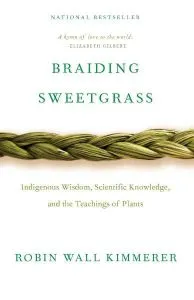 About The Book
About The Book
Taking a step away from the reality and logistics of living off grid, this book is more focused on your mindset of living off grid. It explores the relationship between humans and nature from the perspective of an indigenous scientist. The author, Robin Wall Kimmerer, is a botanist and member of the Citizen Potawatomi Nation. The book is about how she weaves together her scientific understanding of plants and her indigenous knowledge to provide a unique perspective on the natural world. It is divided into chapters that cover a variety of topics such as gratitude, restoration, and relationships.
“We are showered every day with gifts, but they are not meant for us to keep. Their life is in their movement, the inhale and the exhale of our shared breath. Our work and our joy is to pass along the gift and to trust that what we put out into the universe will always come back.”
Robin shares personal stories, reflections, observations, and traditional teachings and scientific knowledge of many different plants and their uses. Throughout the book, she encourages the readers to see the natural world as a source of guidance and inspiration, rather than just a resource to be exploited. The book encourages readers to develop a deeper understanding and connection with the natural world and its inhabitants and to consider the ethical implications of human interactions with the environment.
The audiobook version is also amazingly well done and is even narrated by the author herself.
What You’ll Learn From This Book
Reading this book will give you a unique perspective on the relationship between humans and nature, by blending Indigenous knowledge and scientific understanding. While this may not be necessary or help you plan to live off grid, I believe it is an important aspect of why you would live off grid, and help you shape your path for living off grid.
Some of the skills you’ll learn about:
- Understanding the traditional indigenous teachings and knowledge about plants, their uses, and their spiritual significance
- Gaining a deeper appreciation for the natural world and its inhabitants, and seeing plants and other living things as more than just resources to be exploited
- Learning about the scientific properties of different plants and how they interact with the environment
- Developing an understanding of the ethical implications of human interactions with the environment
- Gaining a new perspective on the relationship between humans and nature, and the importance of respecting and learning from traditional knowledge
- Personal stories and reflections from the author, providing an intimate look into the author’s personal journey, experiences, and insights.
Overall, the book aims to provide a holistic view of the natural world, by weaving together Indigenous wisdom, scientific knowledge, and personal reflection. It encourages readers to develop a deeper understanding and connection with the natural world and to consider the ethical implications of human interactions with the environment.
Read, Read, And Read Some More
Depending on how “off grid” you decide to live, you’ll find you may have a lot of time to think and ponder. Reading is a great escape from reality, but it can also be one the greatest tools in your shed. Find a few interest from these books and branch out and learn as much as you can. Your hands are going to be full and you’ll constantly be learning new skills, and there will always be a book or source of information that can help you out. I plan to continue adding more reading material to this website, but for now, I wanted to add a few books that I believe will help you with getting started on creating a successful and fulfilling off grid experience.
God Bless and see you soon.


